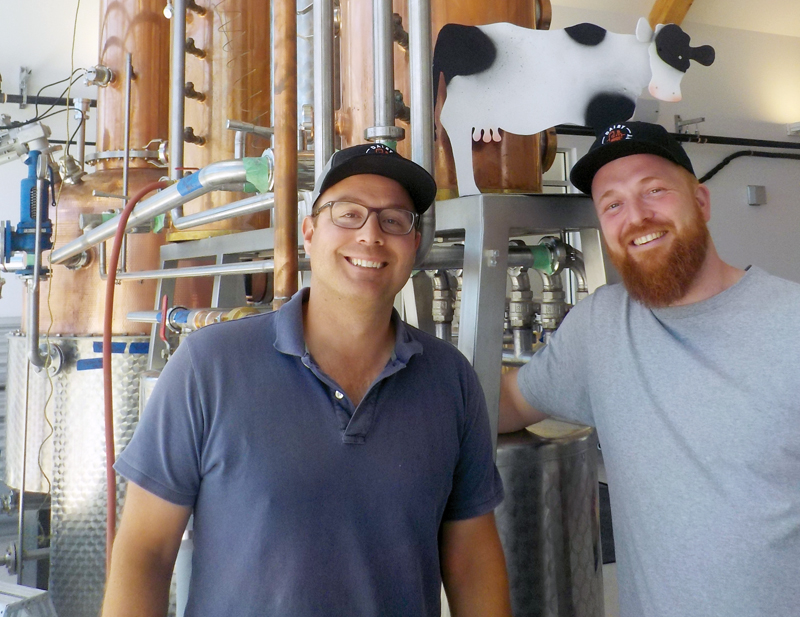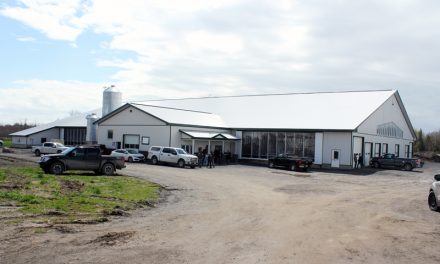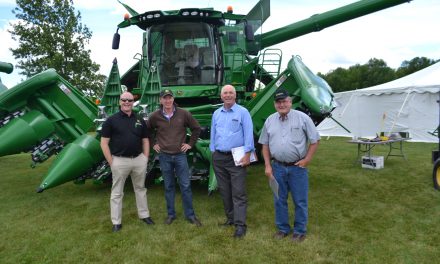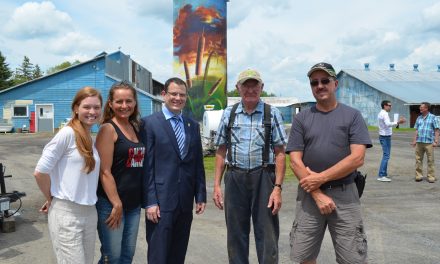Industry vision
Omid McDonald and Neal McCarten are pictured with their Dairy Distillery still, a second hand German-made copper still at their facility in Almonte. Van Dusen photo
by Tom Van Dusen
AgriNews Staff Writer
ALMONTE – It can be a thing of beauty what a couple of guys can come up with sometimes while chatting over some adult beverages.
Omid McDonald and Neal McCarten were doing just that a few years ago, discussing their backgrounds and various business possibilities. Growing up, McCarten worked on a family-owned dairy farm and lamented the fact that milk was sometimes dumped due to excess production and unwanted components. McDonald had experienced a series of business startups; both appreciated small-batch crafted spirits.
Hey, wait a minute! How about we turn excess milk into spirits with something called Dairy Distillery! We could make Vodkow! While it sounds a bit wacky, it had been done by others before them and now the business buddies are doing it again on Industrial Drive in Almonte, with plenty of expansion room out back.
With a second hand German-made copper still as the centrepiece, McDonald and McCarten are nearing completion of a barn shaped distillery, bottling room, tasting counter and retail store they expect to be open early this fall at a cost of close to $2-million.
They’re surrounded by others in food and beverage manufacturing including a coffee roaster, chocolatier, and donut maker. Vodkow will be sold in containers evoking the glass milk bottle of yesteryear.
But the final product doesn’t taste at all like milk, they assure, pointing out they’ve done considerable sampling. Smooth and clean, Vodkow tastes like traditional vodka; their spirits have been tested for content at a University of Ottawa lab, double-checked by the LCBO, and have been confirmed for general marketing.
The dynamic duo has pretty much jumped all of the approval hurdles, with a few steps left at the federal level. Compared to seeking permits in the medical devices field which he’s been in before, it’s been relatively easy, McDonald says. Not only that, there’s been a lot of support for the concept with few officials staring in disbelief when the entrepreneurs mention the product is vodka made from milk.
The process is simple enough and is of benefit to everyone in the supply chain. When the two Mcs started out, there was excess skim milk in the Ontario milk marketing system which has since been absorbed. What doesn’t get fully used, however, is milk permeate, excess lactose, minerals and water left out of the mix during processing at factories such as Parmalat.
They have a contract with the Winchester cheesemaker for an initial bulk delivery in July of 6,000 litres of permeate. When in full production, their facility will handle up to 30,000 litres a week. All spirits are made by fermenting sugar and in this case the sugar used is lactose. While they start with a lactose-heavy raw input, the final distilled product is lactose-free, as well as gluten-free, satisfying demands of many of today’s consumers. In fact, Dairy Distillery fits right into the expanding niche of local food, craft beer, and regional wineries which is becoming a tourism industry onto itself.
The distillers are particularly proud, that by milking the dairy industry for permeate, they’re providing a valid use for what has often been a disposable by-product, a use that could eventually add up to savings for dairy farmers who must pay a permeate removal fee.












